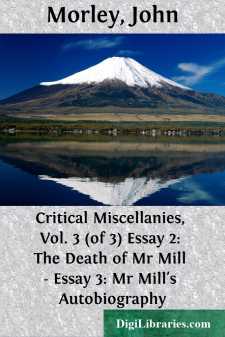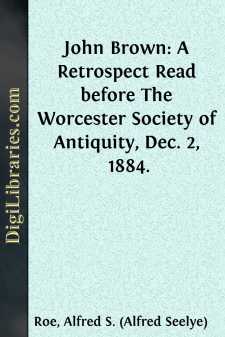Non-Classifiable
- Non-Classifiable 1768
Non-Classifiable Books
Sort by:
I trust that you will pardon me for being here. I do not wish to force my thoughts upon you, but I feel forced myself. Little as I know of Captain Brown, I would fain do my part to correct the tone and the statements of the newspapers, and of my countrymen generally, respecting his character and actions. It costs us nothing to be just. We can at least express our sympathy with, and admiration of, him...
more...
I.—Silverhorns By Henry van DykeTHE railway station of Bathurst, New Brunswick, did not look particularly merry at two o'clock of a late September morning. There was an easterly haze driving in from the Baie des Chaleurs and the darkness was so saturated with chilly moisture that an honest downpour of rain would have been a relief. Two or three depressed and somnolent travelers yawned in the...
more...
by:
Bertha Thomas
EARLY YEARS. In naming George Sand we name something more exceptional than even a great genius. Her rise to eminence in the literature of her century, is, if not without a parallel, yet absolutely without a precedent, in the annals of women of modern times. The origin of much that is distinctive in the story of her life may be traced in the curious story of her lineage. George Sand was of mixed...
more...
CATHARINE MARIA SEDGWICKDuring the first half of the nineteenth century, Miss Sedgwick would doubtless have been considered the queen of American letters, but, in the opinion of her friends, the beauty of her character surpassed the merit of her books. In 1871, Miss Mary E. Dewey, her life-long neighbor, edited a volume of Miss Sedgwick's letters, mostly to members of her family, in compliance with...
more...
by:
John Morley
THE DEATH OF MR. MILL. (May 1873.) The tragic commonplaces of the grave sound a fuller note as we mourn for one of the greater among the servants of humanity. A strong and pure light is gone out, the radiance of a clear vision and a beneficent purpose. One of those high and most worthy spirits who arise from time to time to stir their generation with new mental impulses in the deeper things, has...
more...
Handbook to the New El-Dorado. The problem of colonisation in the north-western portion of British America is fast working itself out. The same destiny which pushed forward Anglo-Saxon energy and intelligence into the rich plains of Mexico, and which has peopled Australia, is now turning the current of emigration to another of the “waste-places of the earth.” The discovery of extensive goldfields...
more...
SPIRIT OF THE AGE SERIES The publishers desire to announce that it is their purpose to comprise in this series a collection of little books uniform in general style and appearance to the present volume and having for their subjects men and women, whose work and influence, in whatever field of literature or art was their chosen one, may be said to faintly reflect the spirit or tendencies of cultivated...
more...
THE ROCK GARDEN In Europe, particularly in England, the rock garden is an established institution with a distinct following. The English works on the subject alone form a considerable bibliography. On this side of the Atlantic, the rock garden is so little understood that it is an almost unconsidered factor in the beautifying of the home grounds. There are a few notable rock gardens in this country,...
more...
JOHN BROWN: A RETROSPECT. Nearly two thousand years ago, at the hour of noon, a motley throng of people might have been seen pouring forth from the gates of a far Eastern city and moving towards a hill called Calvary. Amidst soldiers and civilians, both friends and foes, the central figure is that of a man scarcely more than thirty years of age. He has all the attributes, in form and features, of true...
more...
by:
John Mead Gould
NARRATIVE. It was bad enough and sad enough that Gen. Mansfield should be mortally wounded once, but to be wounded six, seven or eight times in as many localities is too much of a story to let stand unchallenged. These pages will tell what the members of the 10th Maine Regiment know of the event, but first we will state what others have claimed. The following places have been pointed out as the spot...
more...











